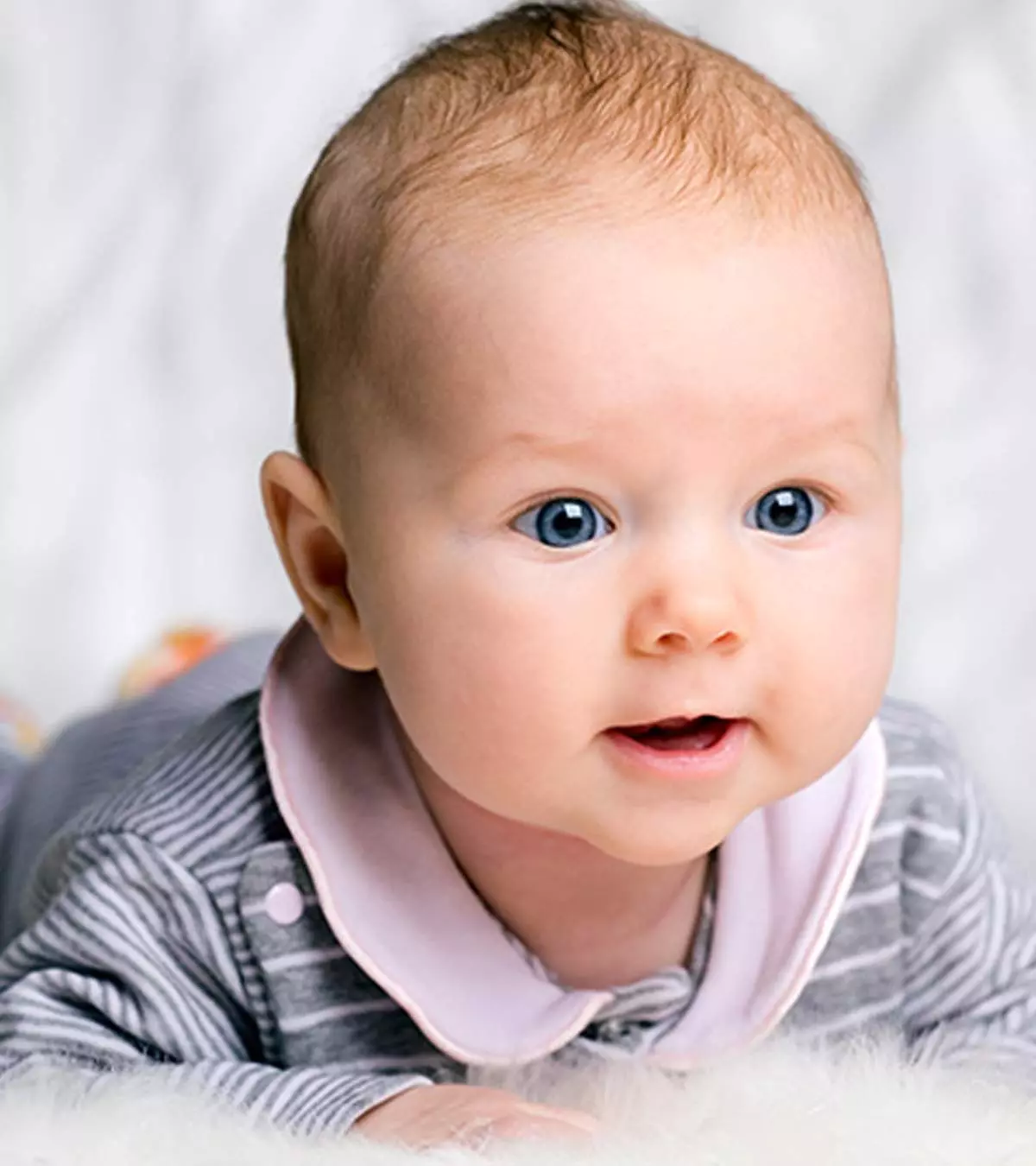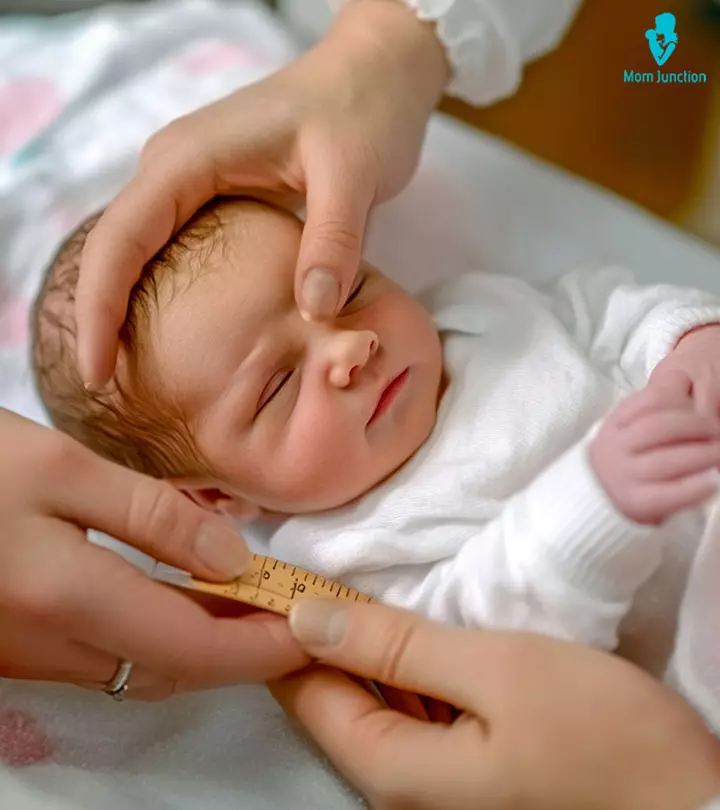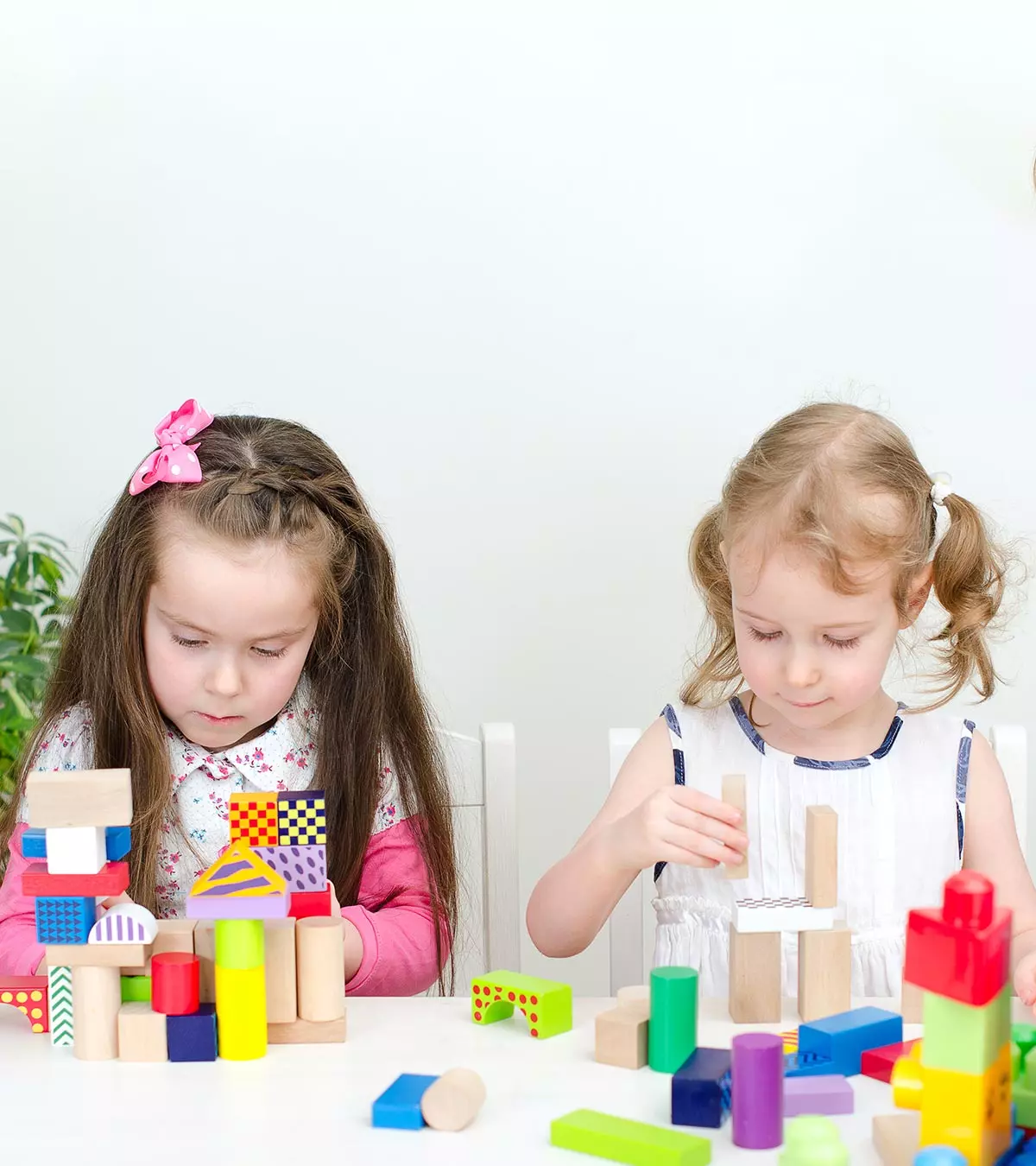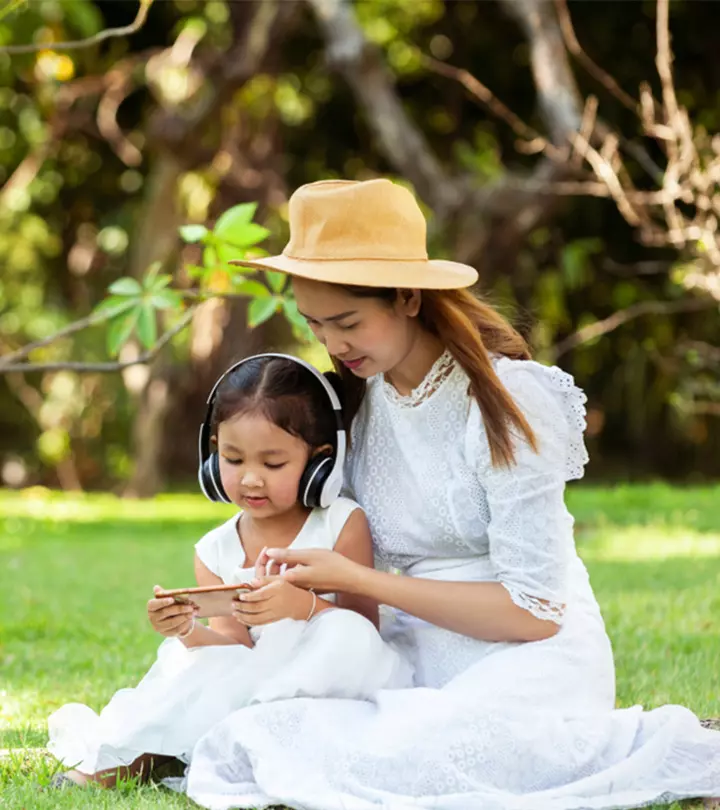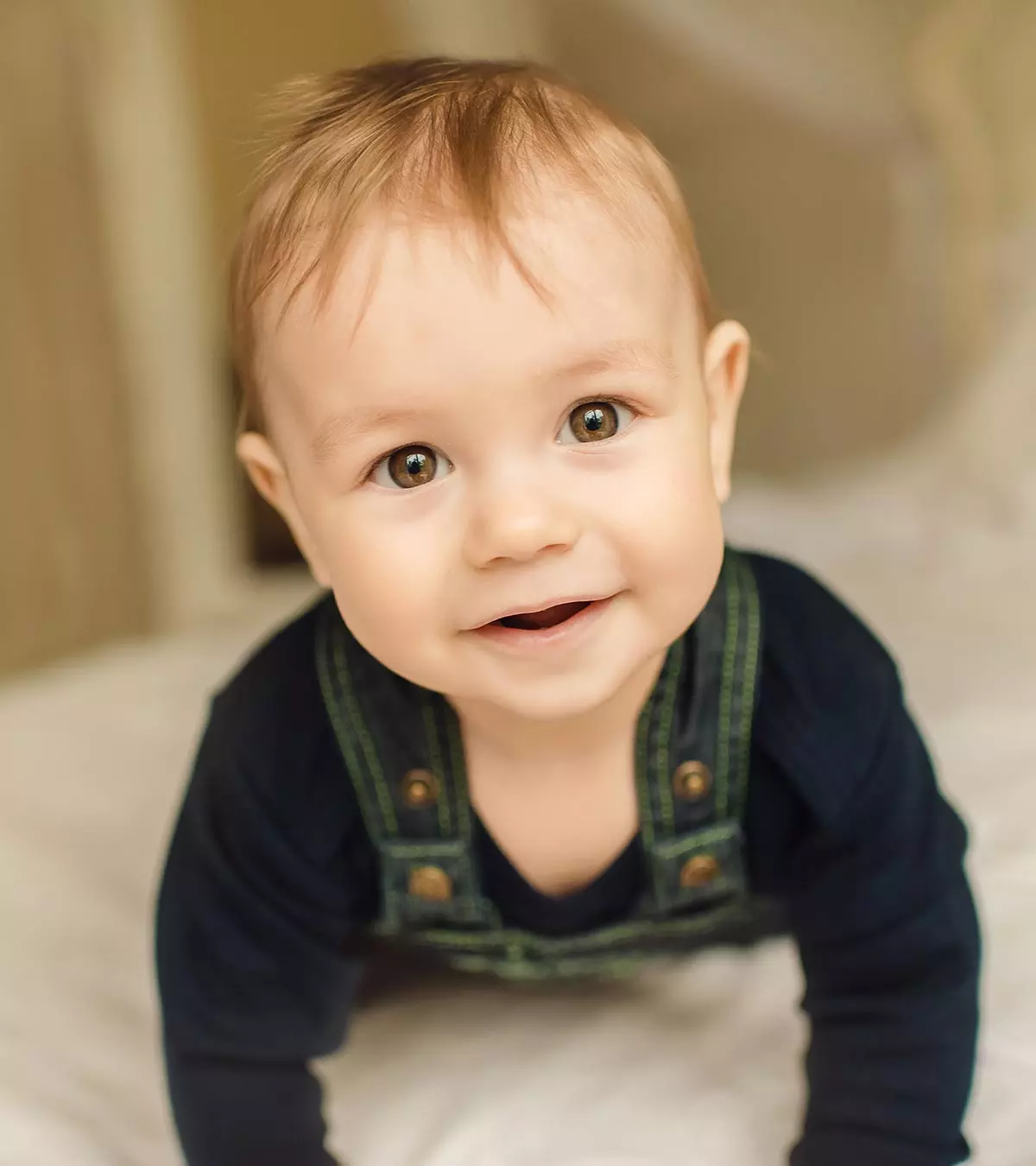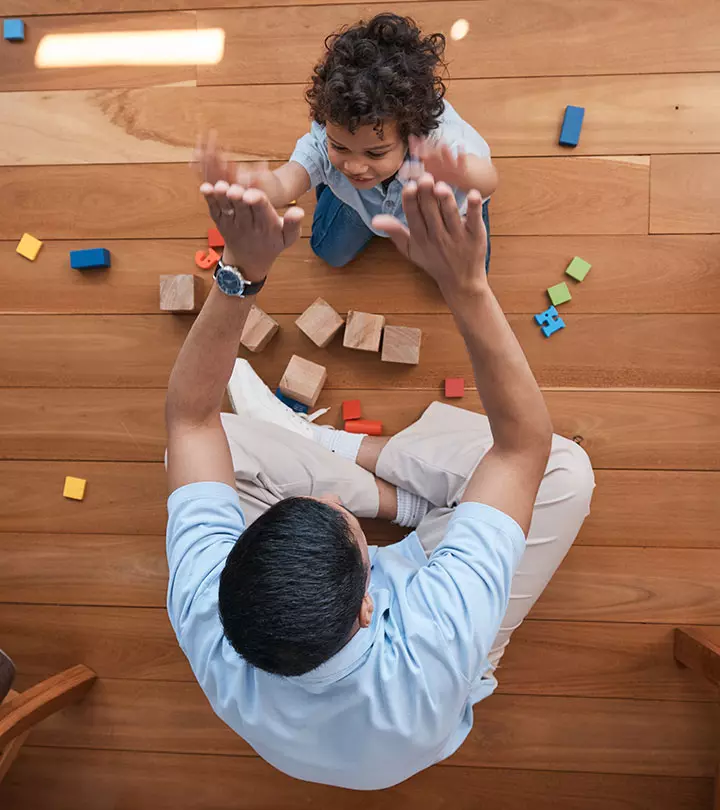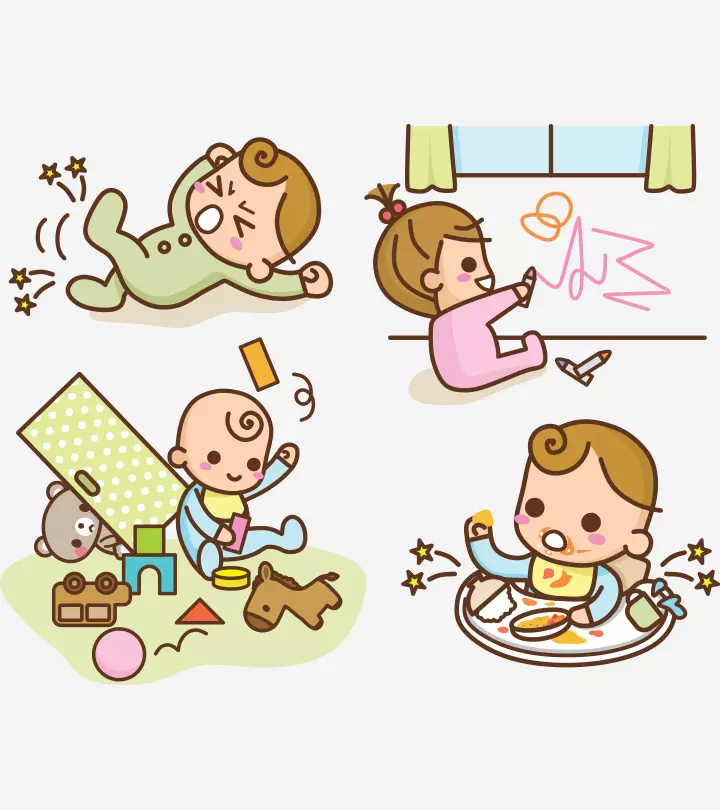
Image: Shutterstock
One-year-olds are too young to self-regulate emotions or express themselves appropriately. They understand the idea of rules, but they can’t resist acting impulsively, which can sometimes be harmful. Thus, parents should know how to discipline a 1-year-old using positive discipline strategies that promote healthy child development. Positive discipline teaches a toddler about acceptable behavior in a firm, kind way, bolstering mutual respect and trust between the parent and child (1).

Read on as we tell you the right age to start disciplining a baby with age-appropriate approaches to discipline your one-year-old with relative ease.
Key Pointers
- One-year-old babies understand what no means, but they can’t differentiate between right and wrong or good and bad.
- Persistent parental guidance and support are necessary to teach them about acceptable and unacceptable behavior.
- Setting clear boundaries, modeling positive behavior, and using redirection or distraction are a few effective ways to promote good behavior in babies and toddlers.
When To Start Disciplining A Baby?
Most babies begin to understand the meaning of “no” between 6 and 11 months of age (2) (3). However, their cognitive development at this age is insufficient to differentiate between right and wrong or good and bad. So, they depend on their parents to know about acceptable behavior and the consequences of their actions (4).
 Experts say
Experts sayThus, as a parent, you should set age-appropriate boundaries for babies and provide them with consistent guidance. This consistency will assist them in developing self-control and responsible behavior over timer (5). You may begin disciplining babies before six months of age. But remember, discipline is more about keeping the baby safe than improving their behavior at that age.
13 Tips To Discipline A One-Year-Old
Disciplining a baby or toddler requires you to understand their development and adopt developmentally appropriate discipline strategies to shape their behavior. Here are some practical tips that can help (6) (7) (8).
1. Create a safe environment
Babies and toddlers touch, smell, taste, roll, and poke everything to learn about their surroundings.
But often, their curiosity compels them to go off-limits and do things that may turn harmful. Therefore, childproof your house and keep everything they shouldn’t touch away from their reach. Here are some ways to do it (9).
- Place safety gates for railings on staircases and rooms that are unsafe.
- Put cupboards and drawers locked.
- Cover electric outlets with safety covers.
- Put all breakable/hazardous items, such as electric cords, medicines, and choking hazards, such as buttons, away from their reach.
Besides, ensure that your baby/toddler is being watched over at all times. Once your baby grows older, you may teach them not to touch certain things.
 Quick tip
Quick tip2. Set clear and consistent boundaries
One-year-olds don’t misbehave intentionally. Rather, they challenge boundaries to test their limits and learn about the world around them. So, punishing them for not behaving as desired isn’t right. Instead, you should set clear and consistent limits and enforce them with firmness. If your baby/toddler isn’t following what is said, give them gentle reminders. Additionally, don’t break a rule or compromise on a limit just to calm your child or stop their tantrum.
3. Develop a routine and stick to it
Having a set routine makes a baby/toddler feel safe and secure. Besides, it helps them understand what they have to do and what is expected of them. Furthermore, it helps create clear boundaries that tell a baby/toddler what to expect next. Stick to the planned routine and fit each new activity into the routine without disturbing their mealtimes and naptimes. It will reduce the chances of overwhelming the baby/toddler, preventing tantrums.
4. Be their role model.
Babies and toddlers learn to do things by imitating adults. Incorporating positive role modeling into your parenting style can greatly impact your child’s development and shape their values and beliefs. So, model the behavior you want your child to follow. For instance, if you don’t want your baby/toddler to shout/scream, refrain from yelling at them when they misbehave. Likewise, if you want them to respect you, give respect to people around you and lead by example.
5. Use redirection or distraction
If your baby/toddler is moving toward a harmful object, say a hot iron or gas stove, sternly say no and remove the object if possible. Alternatively, quickly distract and redirect their attention to another safe, interesting activity or give them an object such as a soft toy. It will peacefully end unwanted behavior and eventually help the child learn that certain things are off-limits and they shouldn’t do them.
Diana Irinei, experienced in working with children aged between 6 weeks and 12 years old, shares her secret of distracting kids. She says, “If a toddler is having loads of energy running around and not listening, take two containers out, put some pasta into a container, and start pouring the pasta from one container to another. This way, you catch his attention, and he will want to play too, so now you are in charge of making the rules (i)”
6. Offer limited choices
One-year-olds have an increased sense of autonomy, and they like doing things their way.
You can satisfy their need for control by giving them choices. The ability to make choices boosts their confidence and helps them regulate their emotions. So let your baby/toddler make choices wherever possible. However, ensure to give them no more than two to three choices, as too many options can overwhelm them.
7. Avoid saying “no” frequently
If your one-year-old is about to touch a hot pot on the stove or open the oven door, a stern “No” is vital to stop them. However, saying no to trivial things can cause them to stop taking the instruction seriously. Worst, they may start using it themselves when they don’t want to do something. So try to use “No” only when a baby or toddler’s safety is the concern or they are breaking a rule.
8. Explain desired behavior
Explain the desired behavior that you intend to see to your baby/toddler. It will help a toddler know what is good behavior and how it works. For instance, if your baby/toddler isn’t sharing their colors with a peer, say – “share these colors with your friend,” and make them share a few colors with their peer. When they do so, give them positive reinforcement by praising their efforts and encourage them to continue behaving in that way.
Vaishnavi Devi, a mother of two, discusses her approach to encouraging good behavior in her children. She says, “I’ve learned that we need to set boundaries in our home, not through fear or rewards, but with understanding. For example, instead of saying, “If you do this, I’ll buy you something,” I explain why certain behaviours are important. When my children do something wrong, I don’t stay silent or look the other way. I calmly explain why it’s wrong. Then, I guide them to correct it with a positive approach. So, instead of saying, “Stop watching TV,” I would say, “Let’s do something else now. How about this new activity?” Like when my kids start jumping on the bed, I tell them, “The bed is for sleeping, not jumping. Let’s sit or lie down instead.” It’s about teaching them in a way they can truly understand (ii).”
9. Have realistic expectations
Despite setting rules and providing instructions, you need to understand and acknowledge the limits of your one-year-old’s understanding. The toddler can only understand as much as their cognitive development permits. Therefore, do not set the expectations too high and then become frustrated over how your baby does not do things as instructed. Set expectations relevant to the one-year-old’s age and it will make the process of disciplining smooth for the parent and the child.
10. Praise good behavior
Praising your baby/toddler whenever they follow your instructions, obey rules, or display desirable behavior boosts their confidence and encourages them to keep doing what is expected. Besides, it gives them the desired attention and approval they need from you. So notice and praise their good behavior and ignore behavior you want to discourage. Use phrases such as “I am so proud,” “well done,” and “wow, you did a good job” to appreciate their efforts and make them feel appreciated. Remember, showering your little one with love and positivity can work wonders for their development.
11. Don’t give in to tantrums
Babies and toddlers don’t know how to express their emotions and desires appropriately. Thus, they often burst into anger and frustration and throw temper tantrums when they don’t get what they want (10). If your baby/toddler is throwing temper tantrums, stay calm and reassure your child that you understand their feelings. Hold them if they want you to and offer as much comfort as possible. But, don’t give in to tantrums to help your baby/toddler know that tantrums will not help them get what they want.
12. Keep time-out as a last resort
Time-out is a behavior modification technique that involves removing a child from an environment where misbehavior happened (11). But since babies and young toddlers are vulnerable to fear of abandonment and separation anxiety, they shouldn’t be kept away from their parents (12). Thus, parents should avoid trying time-out for a one-year-old as much as possible.
However, you can use short time-outs if your baby does something dangerous or harmful, such as hitting or biting a sibling (13). To do that, make your baby sit in a safe but boring place with no toys during a time-out. Ensure that they stay within your line of sight even during a time-out. Invite them out of time-out once they are calm to help them learn emotion regulation.
13. Remain calm and composed
Disciplining babies and toddlers can be challenging. But screaming, yelling, or spanking babies is of no use. These negative approaches will do more harm than good. So, try to be calm and collected. Understand why your baby/toddler is behaving in a certain way and guide them to improve. If you feel too agitated, leave the baby/toddler with your partner or caregiver and take some time off to cool. Remember, a one-year-old is still learning cause and effect, so punishment for kids at this age is not effective. Instead, focus on being their guide and support them in learning good behavior through positive and effective discipline. It is a must that one should not be harsh with the child. Physical disciplining is a strict no-no.
 Research finds
Research findsFrequently Asked Questions
1. Why does my one-year-old slap me?
One-year-olds are yet to comprehend their emotions fully. Their act of hitting or slapping someone is a form of communication. They aim to convey something crucial to the person through this behavior. Slapping an adult is also a coping skill when tiny children are stressed and don’t know what to do.
2. Does my baby remember me being angry?
Studies show that babies are quite receptive to the anger of their parents. They can perceive emotions of anger, and they also do not forget it too soon. Research shows that once babies see a person exhibiting angry behavior, they might remember the anger episode and act differently around them, even when that person is not acting angrily anymore (17).
3. What is the role of consistency in disciplining a one-year-old?
Being consistent in disciplining a one-year-old helps them understand rules and routines to follow them invariably. In addition, consistency and predictability promote trust, independence, and emotional security, which in turn reduce problematic behaviors in children (18).
4. What is the role of positive reinforcement in disciplining a one-year-old?
Positive reinforcement is an integral part of child and toddler discipline. When children receive positive feedback or favorable rewards for good behavior, they are motivated to consistently follow them (19).
5. What are some common challenges parents face when disciplining their one-year-old child?
Challenges such as inconsistent disciplining methods between each parent or caregiver, the short attention span of one-year-olds, temper tantrums, and parental frustration may disrupt your process of disciplining your one-year-old child.
6. What are signs that my one-year-old is ready for discipline?
If your baby can understand your simple commands and answer with a ‘Yes’ or “No’ and starts showing anger and frustration, you may start disciplining them.
A one-year-old can’t self-regulate emotions, nor do they understand morality. So they keep pushing their boundaries to test their newfound independence and explore the world around them. This behavior is developmentally normal and not a cause for concern. However, you should know how to discipline a one-year-old to keep the baby safe while teaching them socially acceptable behavior. Remember, one-year-olds are still too young to understand the consequences of their actions. So they need persistent parental guidance and support to know what they should do and what not. Having patience is essential when teaching them.
Illustration: Effective Tips To Discipline A One-Year-Old
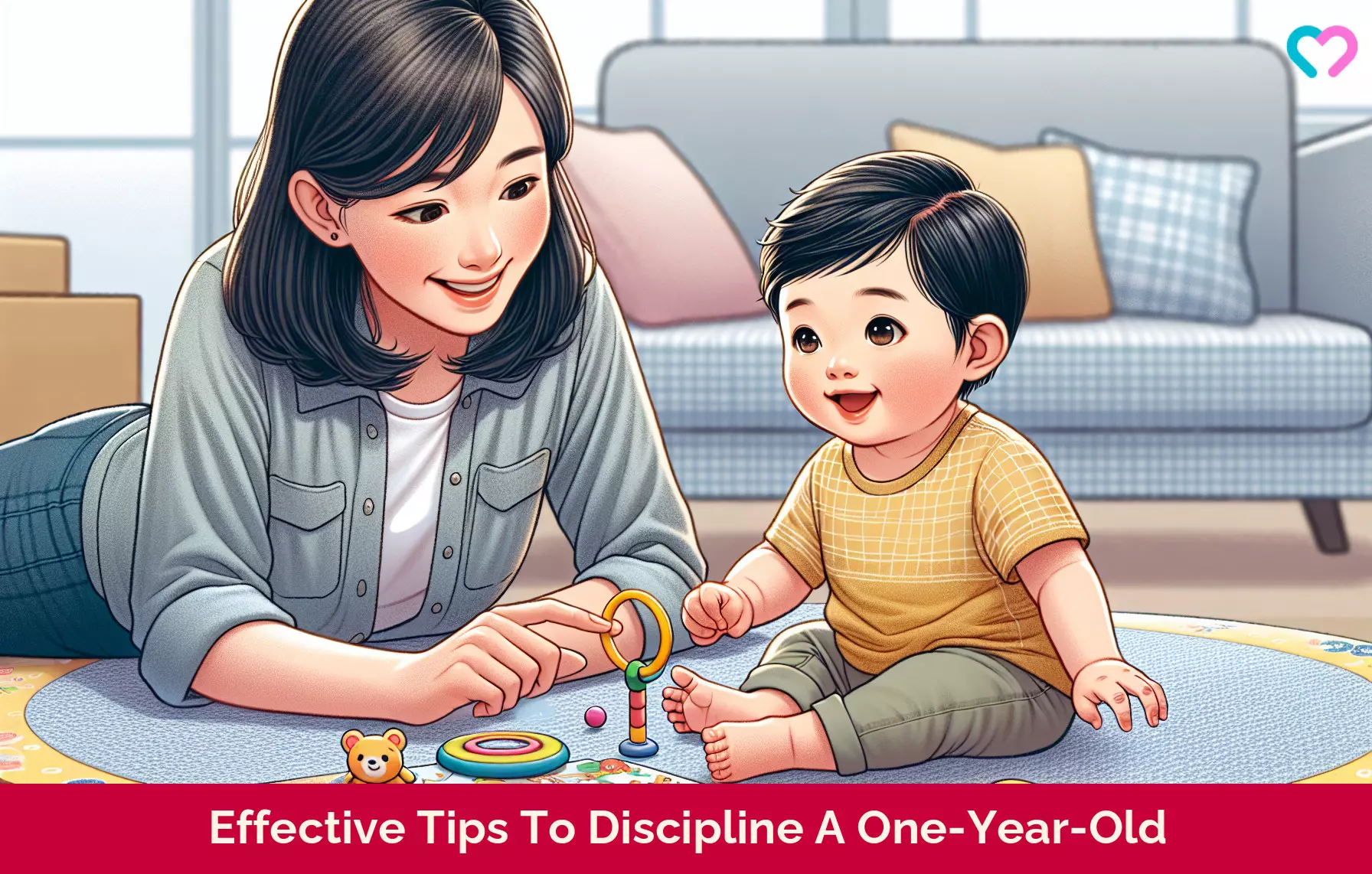
Image: Dall·E/MomJunction Design Team
Infographic: Ways To Discipline A One-Year-Old
A one-year-old is full of energy and enthusiasm to explore their newfound surrounding. However, sometimes, it might get difficult to control them, leading to frustration among parents. Check out the infographic below for various methods to discipline a one-year-old while fostering growth and encouraging good behavior.
Some thing wrong with infographic shortcode. please verify shortcode syntaxBeing the parent of a one-year-old can sometimes be difficult. Watch this video to get some tips on how to effectively manage your toddler’s behavior.
Personal Experience: Sources
MomJunction articles include first-hand experiences to provide you with better insights through real-life narratives. Here are the sources of personal accounts referenced in this article.
i. My experience with toddlers;
https://medium.com/@dianairinei/how-to-make-toddlers-to-listen-to-you-708063284e60
ii. Why I Choose Gentle Parenting: A Journey from Fear to Understanding;
https://medium.com/@VaishnaviDevi2024.dgate/why-i-choose-gentle-parenting-a-journey-from-fear-to-understanding-21be31029ac9
References
- What is Positive Discipline?
https://assets.srhd.org/assets/media/documents/What20is20Positive20Discipline1.pdf - Age-Appropriate Speech and Language Milestones.
https://www.stanfordchildrens.org/en/topic/default?id=age-appropriate-speech-and-language-milestones-90-P02170 - Complete Guide to Developmental Milestones.
https://childmind.org/guide/parents-guide-to-developmental-milestones/ - Kohlberg’s Stages Of Moral Development.
https://www.appstate.edu/~steelekm/classes/psy2664/kohlberg.htm - Babies and Toddlers: Discipline.
https://www.hopkinsmedicine.org/health/wellness-and-prevention/babies-and-toddlers-discipline - How to Discipline Toddlers.
https://childmind.org/article/how-discipline-toddlers/ - Disciplining Your Toddler.
https://kidshealth.org/en/parents/toddler-tantrums.html - Discipline for Babies and Toddlers Does Not Mean Punishment.
https://washington.cce.cornell.edu/parent-pages/babies-young-children/discipline-for-babies-and-toddlers-does-not-mean-punishment - Positive Discipline: A Guide for Parents
https://www.childrensmn.org/images/family_resource_pdf/027121.pdf - Tantrums: why they happen and how to respond.
https://raisingchildren.net.au/toddlers/behaviour/crying-tantrums/tantrums - Tips for Using Time-Out.
https://www.cdc.gov/parenting-toddlers/time-out/ - Effective discipline for children.
https://www.ncbi.nlm.nih.gov/pmc/articles/PMC2719514/ - What’s the Best Way to Discipline My Child?
https://www.healthychildren.org/English/family-life/family-dynamics/communication-discipline/Pages/Disciplining-Your-Child.aspx - Tips for Using Consequences.
https://www.cdc.gov/parenting-toddlers/discipline-consequences/consequences.html - Disciplining your Child.
https://portal.ct.gov/dcf/families/disciplining-your-child#0 - Shawna J. Lee et al., (2014); Parental Spanking of 1-Year-Old Children and Subsequent Child Protective Services Involvement.
https://www.ojp.gov/ncjrs/virtual-library/abstracts/parental-spanking-1-year-old-children-and-subsequent-child - Infants’ generalizations about other people’s emotions: Foundations for trait-like attributions.
https://psycnet.apa.org/doiLanding?doi=10.1037%2Fdev0000097 - The power of consistency while parenting young children.
https://news.sanfordhealth.org/parenting/the-power-of-consistency/ - Childhood Discipline: Challenges for Clinicians and Parents.
https://www.aafp.org/pubs/afp/issues/2002/1015/p1447.html
Community Experiences
Join the conversation and become a part of our nurturing community! Share your stories, experiences, and insights to connect with fellow parents.
Read full bio of Dr. Neha Bhave Salankar
Read full bio of Harshita Makvana
Read full bio of Rohit Garoo
Read full bio of Apoorva K







